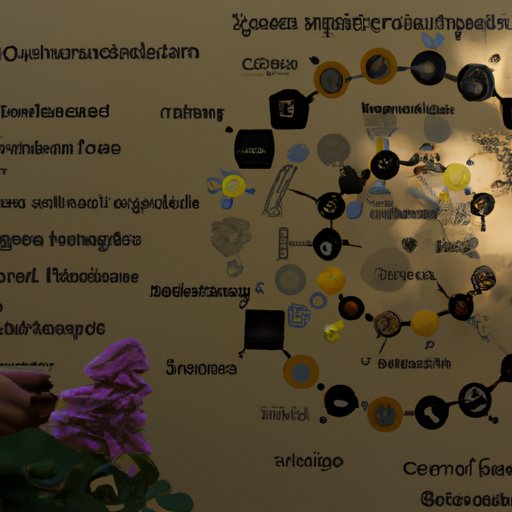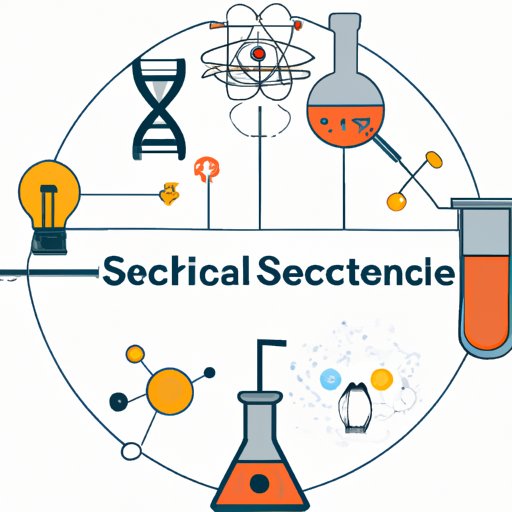Introduction
Science is the pursuit of knowledge and understanding of the natural world through observation and experimentation. It is based on the scientific method, a process used to test hypotheses and form theories about the world around us. This article will explore how science works, examining the steps of the scientific method, different types of science, the role of technology, and the impact of science on society.
Explaining the Scientific Method
The scientific method is a systematic approach to problem solving. It involves making observations, asking questions, forming hypotheses, conducting experiments, analyzing data, and drawing conclusions. The process starts with an observation or question, followed by research and formulation of a hypothesis. The hypothesis is then tested using experiments and data analysis. After the results are analyzed, a conclusion is drawn and the hypothesis is either accepted or rejected. The scientific method is an iterative process, meaning that it can be repeated as needed to refine the hypothesis or answer additional questions.
The scientific method is used in many fields, from biology and chemistry to physics and computer science. For example, a biologist might observe changes in an animal population and use the scientific method to develop a hypothesis about what is causing the changes. The biologist could then design an experiment to test the hypothesis and analyze the results to determine whether the hypothesis is correct.

Examining Different Types of Science
There are many different types of science, including biology, chemistry, physics, and computer science. Biology is the study of living organisms and their interactions with the environment. Chemistry is the study of matter and its properties, such as structure, composition, and behavior. Physics is the study of energy and matter and the interaction between them. Computer science is the study of computers and computing, including the design and development of software and hardware.
Investigating the Role of Technology in Science
Technology has had a major impact on the field of science. In recent years, advances in technology have allowed scientists to conduct more sophisticated experiments and gather more detailed data. For example, new technologies such as DNA sequencing and 3D printing have enabled researchers to make breakthroughs in areas such as genetics and medicine.
Technology has also enabled scientists to collaborate more easily and share data more quickly. For example, online databases and cloud computing have made it easier for scientists to access and share data from around the world. Furthermore, social media platforms have allowed scientists to communicate more effectively and quickly disseminate their findings to a wider audience.

Exploring the Benefits of Science
Science has had a profound impact on our lives. It has improved the quality of life by providing us with better healthcare, safer transportation, and more efficient energy sources. It has also increased our knowledge and understanding of the world around us, allowing us to make informed decisions about our environment, health, and other aspects of our lives.
In addition, science has enabled us to protect the environment and find sustainable solutions to global problems such as climate change. Through scientific research and technology, we can develop renewable energy sources and create more efficient methods of production and consumption.

Describing the Interdisciplinary Nature of Science
Science is an interdisciplinary field, which means that it draws from multiple disciplines to solve complex problems. This is done by combining different areas of expertise to create a more holistic approach to research and problem solving. For example, a project involving the development of a new drug might involve chemists, biologists, and engineers working together to create a solution.
Interdisciplinary science has become increasingly important in recent years due to the complexity of modern problems. For example, the development of artificial intelligence requires expertise from a variety of fields, including computer science, mathematics, and psychology.
Analysing the Impact of Science on Society
Science has had both positive and negative impacts on society. On the one hand, it has led to advances in healthcare and improved quality of life. On the other hand, it has also been responsible for environmental damage and the misuse of technology. It is important to consider both the potential benefits and risks of scientific progress when making decisions about how to use science.
Discussing the Challenges and Opportunities of Science
The field of science is constantly evolving, presenting scientists with both challenges and opportunities. Scientists must stay up to date with the latest technologies and research methods, while also navigating the ethical dilemmas posed by their work. At the same time, they must take advantage of the opportunities presented by science, such as the chance to make breakthroughs in areas such as medicine and energy.
Conclusion
This article has explored how science works, examining the steps of the scientific method, different types of science, the role of technology, and the impact of science on society. Science is a complex field, requiring collaboration between multiple disciplines and the use of cutting-edge technology. Despite the challenges, science has had a profound impact on our lives, leading to advances in healthcare, improved quality of life, and increased knowledge and understanding. As the field of science continues to evolve, it is important to consider the potential benefits and risks of progress.
(Note: Is this article not meeting your expectations? Do you have knowledge or insights to share? Unlock new opportunities and expand your reach by joining our authors team. Click Registration to join us and share your expertise with our readers.)
